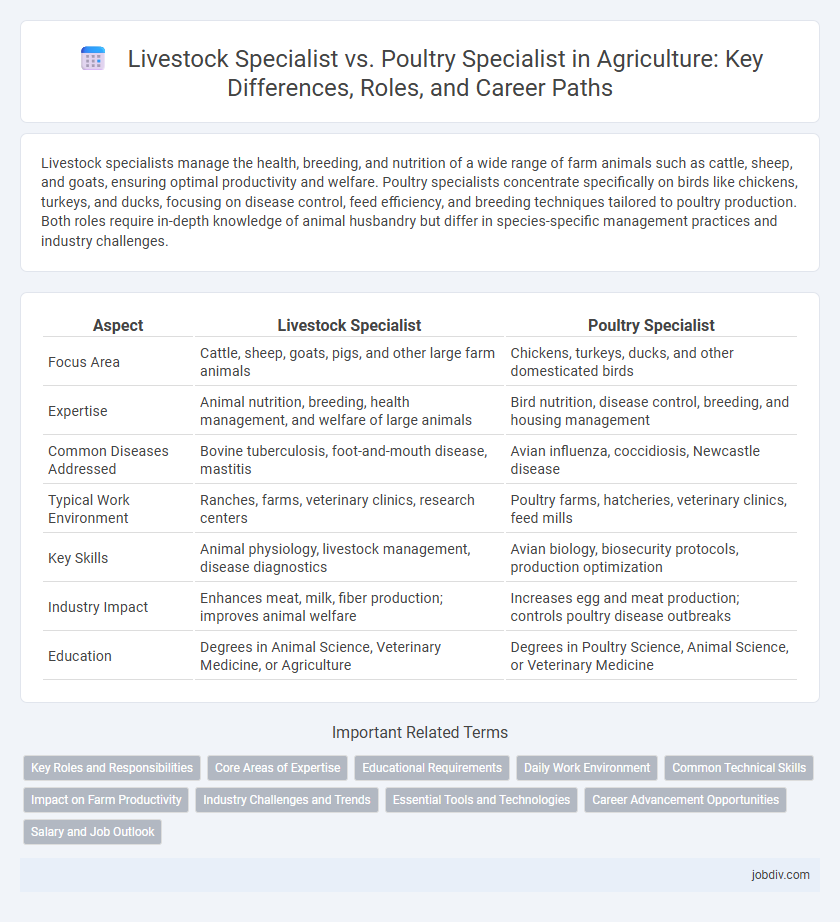Livestock specialists manage the health, breeding, and nutrition of a wide range of farm animals such as cattle, sheep, and goats, ensuring optimal productivity and welfare. Poultry specialists concentrate specifically on birds like chickens, turkeys, and ducks, focusing on disease control, feed efficiency, and breeding techniques tailored to poultry production. Both roles require in-depth knowledge of animal husbandry but differ in species-specific management practices and industry challenges.
Table of Comparison
| Aspect | Livestock Specialist | Poultry Specialist |
|---|---|---|
| Focus Area | Cattle, sheep, goats, pigs, and other large farm animals | Chickens, turkeys, ducks, and other domesticated birds |
| Expertise | Animal nutrition, breeding, health management, and welfare of large animals | Bird nutrition, disease control, breeding, and housing management |
| Common Diseases Addressed | Bovine tuberculosis, foot-and-mouth disease, mastitis | Avian influenza, coccidiosis, Newcastle disease |
| Typical Work Environment | Ranches, farms, veterinary clinics, research centers | Poultry farms, hatcheries, veterinary clinics, feed mills |
| Key Skills | Animal physiology, livestock management, disease diagnostics | Avian biology, biosecurity protocols, production optimization |
| Industry Impact | Enhances meat, milk, fiber production; improves animal welfare | Increases egg and meat production; controls poultry disease outbreaks |
| Education | Degrees in Animal Science, Veterinary Medicine, or Agriculture | Degrees in Poultry Science, Animal Science, or Veterinary Medicine |
Key Roles and Responsibilities
Livestock specialists primarily manage the health, nutrition, and breeding of large farm animals such as cattle, sheep, and pigs to optimize productivity and sustainability. Poultry specialists focus on the care, disease prevention, and production efficiency of birds like chickens, turkeys, and ducks, ensuring compliance with biosecurity standards. Both roles require expertise in animal husbandry, but poultry specialists often emphasize intensive management practices and egg production alongside meat yield.
Core Areas of Expertise
Livestock specialists concentrate on the health, nutrition, breeding, and management of large animals such as cattle, sheep, goats, and pigs, emphasizing herd dynamics, disease prevention, and sustainable grazing practices. Poultry specialists focus on the intensive care, production efficiency, biosecurity, and genetic improvement of domesticated birds like chickens, turkeys, and ducks, addressing issues related to flock health, feed optimization, and egg or meat quality. Both roles require expertise in animal welfare and farm management but differ significantly in species-specific knowledge and production systems.
Educational Requirements
Livestock Specialists typically require a bachelor's degree in animal science, agriculture, or a related field, emphasizing courses in livestock management, nutrition, and health. Poultry Specialists often hold similar degrees but with specialized coursework in poultry biology, disease control, and production systems. Advanced certifications or hands-on experience in hatchery operations and flock management further enhance qualifications for Poultry Specialists.
Daily Work Environment
Livestock specialists primarily manage cattle, sheep, and goats, working on farms or ranches to monitor animal health, nutrition, and breeding in open or barn settings. Poultry specialists focus on chickens, turkeys, and other birds, often operating in controlled environments like poultry houses to optimize feed efficiency and disease prevention. Both roles require regular inspections and data recording but differ in species-specific care techniques and facility types.
Common Technical Skills
Livestock specialists and poultry specialists both require strong knowledge in animal anatomy, health management, and nutrition to optimize productivity and welfare. Proficiency in disease prevention, vaccination protocols, and biosecurity measures is essential in both roles to minimize health risks and ensure sustainable livestock or poultry production. Skills in data analysis, record keeping, and the use of farming technology enhance decision-making and improve operational efficiency across livestock and poultry farming systems.
Impact on Farm Productivity
Livestock specialists enhance farm productivity by optimizing the health, nutrition, and breeding of large animals like cattle and sheep, leading to improved meat, milk, and wool yields. Poultry specialists focus on the efficient management of birds such as chickens and turkeys, improving egg production, growth rates, and disease resistance. Both roles drive productivity by applying species-specific knowledge that maximizes output and minimizes losses.
Industry Challenges and Trends
Livestock specialists address challenges such as disease management, feed optimization, and sustainable breeding practices to improve cattle, sheep, and swine production efficiency amid climate change pressures. Poultry specialists focus on biosecurity, rapid disease outbreak response, and advancements in automated feeding and environmental controls to meet rising global demand for poultry meat and eggs. Both roles must adapt to trends in antibiotic-free production, precision farming technologies, and regulatory compliance to enhance animal welfare and food safety in the agriculture industry.
Essential Tools and Technologies
Livestock specialists rely heavily on advanced animal health monitoring systems, automated feeding technologies, and genetic selection software to enhance herd productivity and disease management. Poultry specialists utilize climate control systems, automated egg collection devices, and biosecurity technologies to optimize bird growth and prevent disease outbreaks. Both fields increasingly incorporate data analytics platforms and IoT-based sensors to improve operational efficiency and animal welfare.
Career Advancement Opportunities
Livestock specialists often have broader career advancement opportunities, managing diverse animal species, including cattle, sheep, and swine, which increases their expertise scope and industry demand. Poultry specialists, while more focused, benefit from specialized roles in poultry production, disease control, and nutrition, critical for large-scale commercial operations and biosecurity management. Both career paths offer progression into research, farm management, and advisory roles, with livestock specialists typically accessing more diverse leadership positions due to their wider animal agriculture knowledge.
Salary and Job Outlook
Livestock specialists earn an average annual salary of $60,000, with job growth projected at 5% over the next decade due to increasing demand for meat and dairy products. Poultry specialists typically make slightly less, around $55,000 per year, but face a faster job growth rate of 7%, driven by expanding poultry production and consumer preferences for poultry-based proteins. Both roles require expertise in animal health, nutrition, and breeding, but the poultry sector's higher growth reflects industry trends toward sustainable and efficient food sources.
Livestock Specialist vs Poultry Specialist Infographic

 jobdiv.com
jobdiv.com